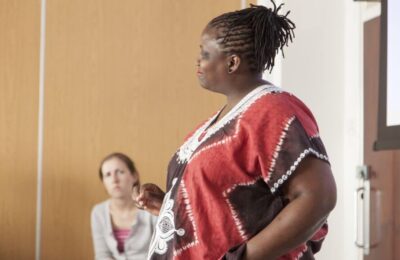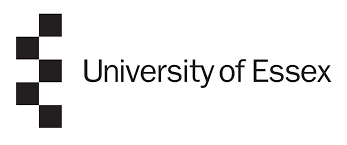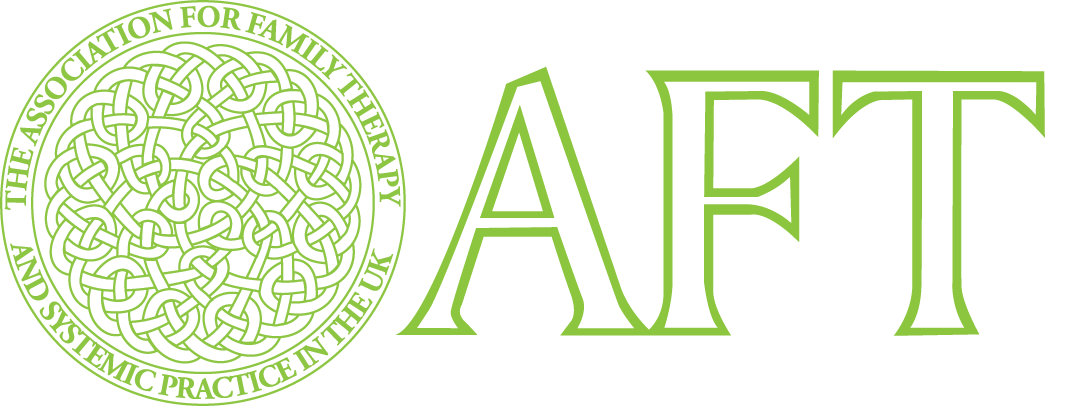
Systemic psychotherapy (M6)
Join the UK’s longest-running systemic family therapy qualifying course
Taught in a highly regarded NHS setting by experienced clinicians, this course was the first of its kind in the UK.
Successful completion provides you with a professional qualification accredited by the Association for Family Therapy and Systemic Practice and enables you to register with the United Kingdom Council for Psychotherapy (UKCP). If you are applying for a Health Education England funded place, please see the fees and funding section below.
Please note: you may see the M6 course also referred to as SYMATP002 in communications from our application system.
About this course
This course is a rigorous and intensive programme. It will extend your understanding of theoretical concepts in systemic psychotherapy and fully develop your clinical skills as a systemic psychotherapist, being able to work with individuals, couples, families and organisations. You will learn through live clinical supervision of your practice, clinical work, personal and professional development, research, teaching and consultancy, lectures and seminars.
Clinical supervision
You will provide family therapy to clients/service users which will be supervised live by a trained systemic supervisor in clinical supervision groups. You will meet in the group for up to five hours per week throughout the two years of the course. You will work with families across the life cycle stages, either in a child and adolescent mental health service (CAMHS) or an adult setting, taking a range of referrals and presenting problems.
Consulting relationships between peers are encouraged as part of the clinical supervision process (and in other contexts). The consultation role that you take within your consulting partnerships will develop your capacity for leadership. This part of the course we arrange for you.
Clinical work
You will also need to set up your own clinical work and systemic supervision in your external agency or placement and keep a log of your hours and learning. This is required by the Association of Family Therapy (AFT) to enable you to practise new skills and theoretical learnings.
We will only be able to accept you on the course if you have set up your own clinical work and you will need a systemic supervisor for this work. The supervision does not need to be live but can be retrospective as long as it is conducted at least once a month.
Personal and professional development
As a therapist you will be required to reflect upon your own personal life experiences and share these with other students in order to understand the connections between you and the clients you work with. Much of this activity will take place in groups.
This is an important reflective space where you will be encouraged to think about your contribution to group dynamics and the wider organisational system being created in this learning environment. Attending a group relations conference is a requirement of the course.
As part of your application, you are required to write a personal statement which should include reference to your family of origin and incidents in your personal life that you feel are connected to why you would like to be considered for the Master’s training.
Research
The research aspect of this course is designed to help you develop a research ‘frame of mind’ by introducing you to quantitative and qualitative research paradigms and a number of research methods. You will either complete a research portfolio or a research dissertation.
Teaching and consultancy
You will be offered the opportunity to embed your systemic knowledge by teaching and offering consultation to groups of professionals externally. One of your assignments will be setting up a short piece of teaching usually in your work context.
Lectures and seminars
More information will be added shortly regrading the frequency and time commitment for these sessions (five hours per week for supervision groups, for example).
Modules
Module 1: Advanced Systemic Theoretical Ideas
- Year of Study: Year One
- FHEQ Level: Level 7
- Credit Weighting: 20 credits
- Module Status: Core
- Module Leader: Joanne Adams
Module Aims
- To extend students’ knowledge of the theoretical concepts in the Systemic Psychotherapy field.
- To substantially develop students’ capacity to articulate and critically evaluate these theoretical concepts, and present them fluently to others with particular attention to the self of the therapist and to contextual influences like race, culture, gender and class.
Module Assessment
Students are required to submit a 3,500-word essay.
Module 2: Advanced Systemic Clinical Practice 1
- Year of Study: Year One
- FHEQ Level: Level 7
- Credit Weighting: 20 credits
- Module Status: Core
- Module Leader: Shila Rashid
Module Aims
- To enable students to work effectively with complex cases involving emotive or charged issues.
- To enable students to conceptualise and to apply a range of Systemic concepts and approaches to their work.
- To support students to take responsibility for developing and improving their clinical and organisational knowledge and skills, and those of their colleagues, through reflection, self-reflexivity and critical analysis of their own and each other’s work.
Module Assessment
Students are required to submit a clinical portfolio, comprising 10 learning logs of 1,000 words each, plus a self-report of 1,500 words.
Module 3: Research Methods
- Year of Study: Year One
- FHEQ Level: Level 7
- Credit Weighting: 20 credits
- Module Status: Core
- Module Leaders: Joanne Adams & Shila Rashid
Module Aims
- To familiarise students with a range of research approaches relevant to systemic psychotherapy practice.
- To develop a critical awareness of the research base for systemic family therapy.
Module Assessment
Students are required to submit a 3,500-word essay.
Module 4: Advanced Systemic Clinical Practice 2
- Year of Study: Year Two
- FHEQ Level: Level 7
- Credit Weighting: 20 credits
- Module Status: Core
- Module Leaders: Shila Rashid
Module Aims
- To strengthen the link between theoretical ideas and clinical practice, with attention to different clinical contexts.
- To train students as a highly skilled systemic clinicians, who can provide a variety of different interventions closely linked to theoretical concepts and ideas in the systemic field.
Module Assessment
Students are required to submit a clinical portfolio, comprising 10 learning logs of 1,000 words each, plus a self-report of 1,500 words.
Module 5: Clinical Development
- Year of Study: Years One & Two
- FHEQ Level: Level 7
- Credit Weighting: 20 credits
- Module Status: Core
- Module Leader: Rukiya Jemmott
Module Aims
- To enhance students’ ability to understand the application of systemic practice in different contexts.
- To enable students to recognise their own contribution in multidisciplinary settings, and appreciate the different influences on this.
- To enable students to articulate the connections between theory and practice.
Module Assessment
Students are undertake a 40-minute clinical presentation, including two recorded clips, which should last at least 10 minutes. Students are also required to submit a 1,500-word summary.
Module 6: Systemic Leadership, Consultation and Teaching
- Year of Study: Year One & Two
- FHEQ Level: Level 7
- Credit Weighting: 20 credits
- Module Status: Core
- Module Leaders: Beverly Clarke & Sally Bates
Module Aims
- To support the student’s journey of development from systemic psychotherapist in training to becoming a qualified systemic psychotherapist.
- To enable students to perceive themselves as leaders in organisations, equipped as agents for change and development in public, private and third sector institutions.
Module Assessment
Students are required to prepare, deliver and record a 1.5-hour teaching session on a systemic concept. They must then deliver a 20-minute presentation, including a 5-minute clip from this recording, and submit a 2,000-word reflexive summary.
Module 7: Dissertation
- Year of Study: Year Two
- FHEQ Level: Level 7
- Credit Weighting: 60 credits
- Module Status: Core
- Module Leaders: Joanne Adams & Shila Rashid
Module Aims
- To extend the knowledge and skills developed in year 1 to complete a dissertation, which can take the form of either: a research dissertation (a small clinical research study, where the research question is of relevance to systemic practice) or research portfolio (three research-related assignments, each addressing a different set of research competencies).
Module Assessment
Students are required to submit either a 12,000-word research dissertation, or a research portfolio, made up of two 4,000-essays and a 4,000-word research proposal.
Who is this course for?
This course is for professionals who have completed the foundation and intermediate levels of systemic training and are currently working in the field of mental health, social work/care or education.
Course details
In order to undertake this course, you need to:
- hold a professional qualification in social work, teaching, psychology, psychiatry, psychotherapy, nursing or an affiliated discipline, or equivalent
- hold an undergraduate degree or are able to demonstrate that you are able to meet the demands of a Master’s level course
- have completed an AFT-accredited intermediate level systemic/family therapy training course. Please note that this is a mandatory requirement – we can only accept applications from those who have completed or are in the process of completing an intermediate level training such as our Systemic approaches to working with individuals, families and organisations (D4I) course
- be currently working in the field of mental health, social work/care or education, where you have regular contact with families and are able to practice systemic psychotherapy for a minimum of 100 hours annually while attending the course
In addition, as part of your application, you are required to submit a short essay of 1,500 words, discussing one of the following subjects:
- shame
- power
- responsibility
- risk
- protection
- resilience
You may venture as widely as you wish or stay close to the subject of therapy in your deliberations, but aim to include personal reflections and any systemic ideas that you connect to the theme. Your grasp of theoretical ideas and the ability to be self-reflexive will be considered.
Please note that applicants are required to use Harvard referencing.
Personal statement
In addition to the essay, applicants are required to write a personal statement including personal information about your family of origin and how this connects to your development so far. Please write about your relationships from your early life as well as present day, and any significant episodes that you feel connect to your learning about yourself. Please let us know about your aspirations for your future career.
This section does not need referencing and should be a maximum of 500 words.
If you do not have an undergraduate degree or have completed your intermediate level training more than four years ago, please see below as you will have to complete a longer essay in place of this. You will only need to complete one essay as part of your application. If you are unsure what you need to complete then please contact us for confirmation.
Applicants without an undergraduate degree and/or who have completed their intermediate training more than four years ago can demonstrate equivalency by:
- completing a 3,500-word essay discussing and critiquing a systemic theoretical idea of your choice. Your ideas must be up-to-date theoretically and you should demonstrate self-reflexivity. Please note that applicants are required to use Harvard referencing
- providing us with details of any relevant CPD courses you have undertaken, if you have completed your intermediate training more than four years ago
Applicants who do not have a professional qualification
If you do not have a previous professional qualification, you may still be eligible to apply for the Master’s programme. However, you will need to complete a portfolio detailing a body of clinical work and training that demonstrates equivalence to a first profession.
You are required to upload your portfolio at the time of application. Please provide this in CV style, and specify where you have worked, your responsibilities and the duration of each post. In addition, please tell us about any further training or CPD that you have completed.
Please provide as much information as you can; the more detailed the portfolio, the easier it is for the tutors to assess an applicant’s suitability for the course.
Clinical experience
Examples of suitable professions are:
- social worker
- nurse
- doctor
- psychologist
- counsellor (accredited to a professional body)
- teacher/pastoral worker with substantial experience working with families
- music/drama therapist
If you are unsure about your clinical experience then please contact us to arrange a conversation with a member of our course team.
Home
£8,610 per year (2025/26)
International
£17,220 per year (2025/26)
You will be charged course fees for each year of your course. If your course is longer than one year, the fees that you will be charged after the first year will be subject to an annual uplift, which is not normally expected to exceed 6% or the Consumer Price Index (as stated on 01 September of that academic year) if higher than 6%. At its discretion and in rare instances, the Trust may determine a figure greater than either, to reflect costs associated with the activity (e.g. assessment, teaching, administration etc.), which shall not exceed 10%. Please refer to our Terms and Conditions, and Student Fees & Refund Policy for further information.
Financial support may be available to help you fund your studies at the Tavistock and Portman NHS Foundation Trust.
Assessment
There are various ways that students will be assessed throughout the two years of training.
Students’ skills will be assessed by their clinical supervisor on the competencies set by the course and the AFT. Students need to pass their first year to go on to the second year.
There will be several written assignments during the first year and a dissertation in the second year (students are able to resubmit if necessary, under the guidelines of the University of Essex). Students will also have a viva.
Attendance
Year one
- Sessions will take place on Thursdays and Fridays on the dates shown in the table below
- Timings for Thursdays are 9.00am to 5.30pm
- Timings for Fridays are 9.00am to 4.30pm, except for the final sessions of each term which will finish at 5.30pm
Dates for Year 1 Students in 2024/25
| Welcome Week | 23 – 28 September 2024 |
| Induction Days | 12 – 13 September 2024 |
| Block 1 | 17 – 18 October 2024 |
| Block 2 | 7 – 8 November 2024 |
| Block 3 | 5 – 6 December 2024 |
| Group Relations Conference (GRC) | W/C 16 December 2024 |
| Block 4 | 16 – 17 January 2025 |
| Block 5 | 6 – 7 February 2025 |
| Block 6 | 6 – 7 March 2025 |
| Group Relations Conference (GRC) | W/C 24 March 2025 |
| Block 7 | 3 – 4 April 2025 |
| Block 8 | 1 – 2 May 2025 |
| Research Symposium | 12 June 2025 |
| End of Year 1 | 13 June 2025 |
Upon successful completion of this course, our graduates will hold the professional qualification of systemic psychotherapist that can be used to practice within the NHS, private practice or a combination of both.
With our Master’s at the Tavistock and Portman being the first qualifying course in the UK, our reputation for providing high-quality training is well-known and reflected in the huge number of applications received every year and the swiftness with which our graduates are offered employment very soon after qualifying.
We have an amazing community of systemic psychotherapists, who, depending on their interests, go on to work in a range of contexts with individuals, couples, families and organisations, both nationally and internationally and in voluntary, statutory and private settings.
Apart from clinical practice, our graduates also make substantial contributions to the systemic field as researchers, supervisors, trainers, academic writers and in the virtual space offering podcasts, blogs and videos.
Application support and deadlines
Interested in this course but have questions before applying? Book a 1-1 session with an admissions advisor to find out more.
There are a number of important application deadlines associated with our postgraduate courses, however we encourage you to apply as early as possible, as spaces on our courses are limited and can be competitive.
Applications for this course closed on Monday 20 January 2025.
Why study with us?
This course has been running since 1975 and was the first of its kind in the UK. It will provide you with a professional qualification that enables you to register with the United Kingdom Council for Psychotherapy (UKCP). It is highly regarded and will fully develop your clinical skills to provide family therapy as well as consultation, and teaching to the wider system.
Testimonials
Course facilitators
Validations and accreditations
This course is validated by the University of Essex.
This course is accredited by the Association for Family Therapy and Systemic Practice. The Blue Book, produced by the AFT, is a guide to training standards and course accreditation and standardises the courses nationally and the hours that need to be completed.
Register your interest
Applications are now closed. Register your interest and be the first to hear when this course reopens.
Recommended courses
Explore courses to study beforehand
-
 Postgraduate certificate Eligible for Student Visa
Postgraduate certificate Eligible for Student Visa
Systemic approaches to working with individuals, families and organisations (D4I, intermediate)
Explore courses to study next
-
 Professional doctorate
Professional doctorate 
Advanced practice and research: systemic psychotherapy (M10)
-
 Trust certificate
Trust certificate 
Family and systemic psychotherapy supervision (M21)

